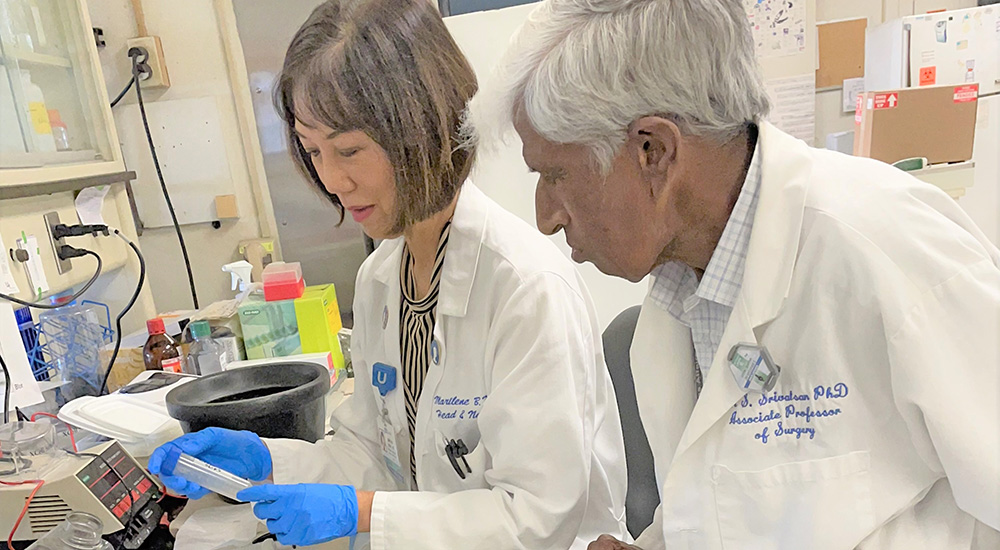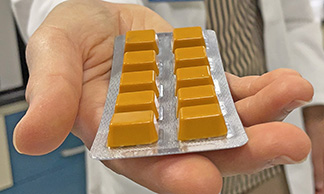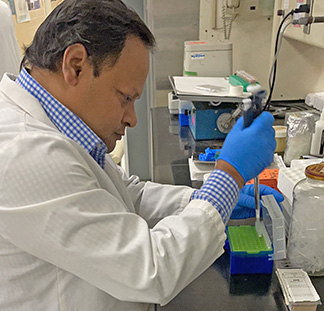For those who develop oral cancer, the options have been limited to surgery, chemotherapy and/or radiation, all of which effect the ability to speak and eat.
Los Angeles VA scientists Drs. Marilene Wang, Eri Srivatsan and Saroj Basak are experimenting with a non-toxic drug called APG-157. The drug is derived from turmeric and has shown promising results.
APG-157 is a novel drug on several levels. It is a multi-agent, multi-targeted drug derived from the curcuma longa plant. The safety and anti-cancer properties of the plant and its principal molecule curcumin are well established.
“The drug that comes in the form of a gummy lozenge has been given to newly diagnosed, locally advanced patients (stage 1-4) with oral or oropharyngeal (throat) cancer before other treatments. It has shown to reduce tumors, lessening the need for extensive surgery and intensive therapies,” Wang said.
About the turmeric lozenge
“Pilot data suggests that APG-157 induces selective cancer cell death, activates the immune system and modulates the dysbiosis of oral microbiome in cancer patients,” Srivatsan said. The drug comes in 100 mg pastilles that dissolve in the mouth, which is better than swallowing.
A problem with swallowing is that as much as 60% of the components quickly disintegrate in the stomach. A lozenge is absorbed through the mucous membranes lining the mouth and thus does not get degraded by the acid in the stomach.
In addition to curcumin, the lozenge delivers other active molecules that exist in turmeric, and the combined action among these molecules provides higher efficacy.
“This stuff is amazing.”
For Veteran Stephen Smothermum, the lozenge is a life saver. He participated in the clinical trial a couple of months ago and has seen the results. “I went to have some dental work done and they found a tumor on my mandible next to my teeth. VA biopsied the pea-size tumor and found it to be cancer,” he said.
Smothermum was told that he would need a marginal mandibulectomy, which meant cutting into and removing part of the jaw. While waiting for the surgery, he joined the study and began taking the lozenge.
“For a month before the operation, I was taking two lozenges three times a day an hour before eating. When I got into the operating room, the surgeon and nurses were all surprised. The tumor had shrunk and all they had to do was scrape it. To me it was a miracle. This stuff is amazing. It has a pain-relieving effect also,” he added.
“This is a window of opportunity.”
“Oral cancer affects the tongue, mouth and throat. It’s common in people who smoke or have the Human Papilloma Virus,” Wang said. “Surgery of the mouth or tongue is painful and the recovery is long. Patients have a hard time eating or speaking. We found APG-157 to shrink small oral tumors and possibly stabilize growth of large ones.”
The trial has Institutional Review Board approval and is dealing with a type of squamous cell carcinoma. While most cancer studies combine the trial drug with standard of care therapies, this is a “window of opportunity” trial in which patients will receive APG-157 four to six weeks before receiving other treatments.
What is Turmeric?
Turmeric is a plant in the ginger family. It is a common spice and is used in curry. Historically, turmeric was used in traditional Indian medical systems as well as Eastern Asian medical systems, such as traditional Chinese medicine.
Topics in this story
More Stories
Bob Jesse Award celebrates the achievements of a VA employee and a team or department that exemplifies innovative practices within VA.
The Medical Foster Home program offers Veterans an alternative to nursing homes.
Watch the Under Secretary for Health and a panel of experts discuss VA Health Connect tele-emergency care.









Can I get this prescribed for me I don’t have the cancer yet, I have extremely burning painful gums and two very very painful tender sore burning from food spots in my mouth.. no upper teeth and only 6 teeth in bad shape on bottom front teeth. This is why dentures hurt and never seem to do anything but more awful pain??